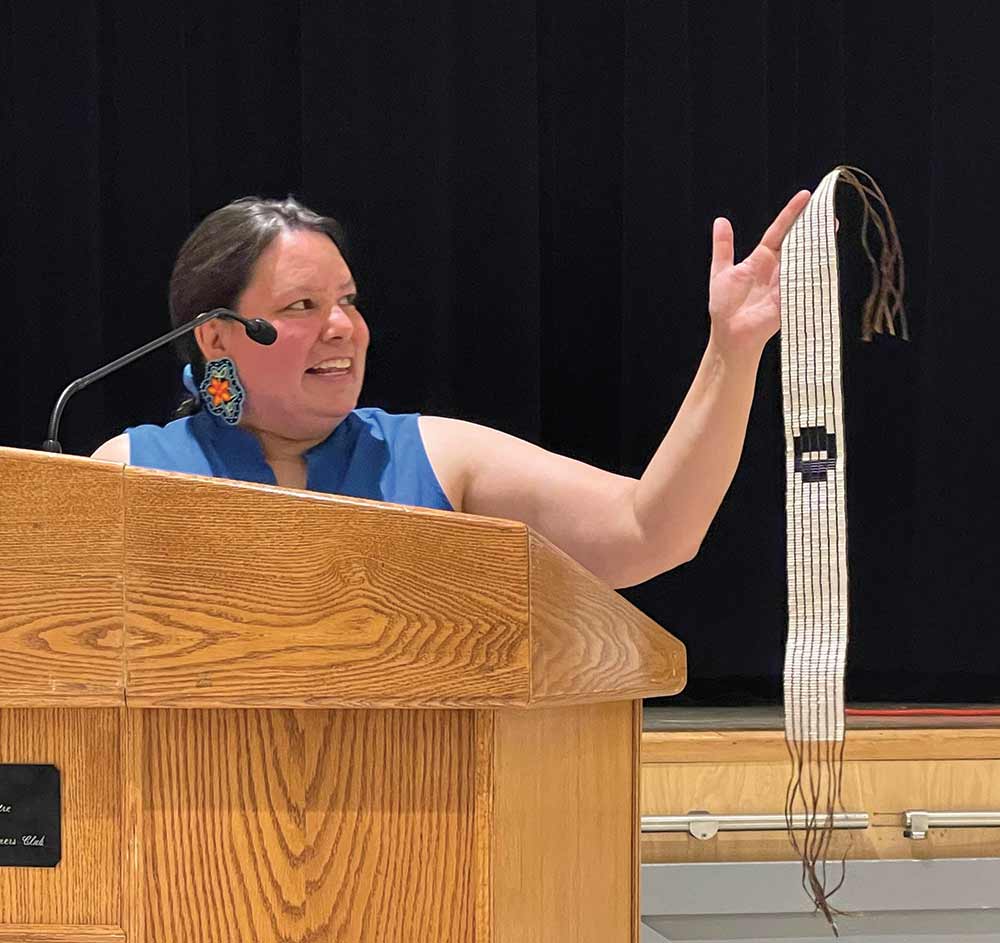Steps Toward Reconciliation welcomes Dawnis Kennedy as guest speaker
Altona’s Steps Toward Reconciliation group welcomed guest speaker Dawnis Kennedy last week to discuss Anishinaabe perspectives on Treaty.
Kennedy is from Roseau River Anishinaabe First Nation, Treaty 1 Territory. She works at the Manitoba Indigenous Cultural Education Centre in Winnipeg, has a Bachelor of Law from the University of Toronto, and a Master of Law and Society from the University of Victoria.
As a graduate student and a Trudeau Scholar, she has focused on Anishinaabe Onaakonigewin (Ojibwe Law) and culture-based education. Kennedy has been called on as a legal expert by the National Inquiry into Missing and Murdered Indigenous Women and Girls and by First Nations with regard to Child Welfare and Family Law from the perspective of Anishinaabe Onaakonigewin and Harvesting Regulation and Relational Laws of the Anishinaabe.
Kennedy is also an activist and a Yellowhead Research Fellow.
During her presentation to a crowd at the Rhineland Pioneer Centre on Sept. 21, she shared her personal view of treaties.
“What I’ve learned is that they are an expression of our law. And I think they’re expressions of the parts of our law that we forgot between us. And we raise up treaty to remind ourselves about life and what was given to us.”
In their pipe ceremonies, Kennedy says they remember every being in creation.
“All the directions above and below and center. They’ll remember all the gifts that were given. And how life flows. That’s the way I understand law as an Anishinaabe. There’s a way that life flows where life is at the center. And is sustainable. Life renews itself through these daily cycles, these seasonal cycles. These yearly cycles. Cycles of eras. To me I think about that as a law. And we have the power of choice. To do things outside of the law. We can do that, but then there’s a counter. It comes back to you or your family. So if you stray from the law, you are also straying from life. And there’s consequences to that.”
Canadian law, she says, can be argued. But Anishinaabe law represents how life flows and can’t be changed.
“And if I want to be within that sheltered, protected, always renewed and re-energized place, I need to live by these laws. Because living these laws is what ensures life not only for me, but for my descendants.”
Kennedy hopes the audience thought about her elders, ancestors, teachers, and her community during the presentation.
“I wanted people to be encouraged to give them weight. To give their words weight. To approach them as a people with great wisdom. That maybe if they don’t see it right away, they have to work with it and think about it, that there’s things that they can say that you turn over. And you realize that over time, they’re evident truth. But you must think about them, and want your life, and see the truth of it in your life. Not something where you say oh it’s true or it’s false. But to say, oh, this is the way life flows. Do I see that to be true in my life? I think my elders’ words are worth reaching for. That’s what I wanted them to see.”
Kennedy says the main reason her ancestors signed the treaty was to protect the trees from being deforested. But as soon as the treaty was signed, more trees were cut down.
“Knowing that and understanding why we need the trees. Why we need the animals. Why they have just as much of a right to a home as we do. Those things are our responsibility. I would like to see more safe spaces for trees and for animals and for our children.
“I think the ways that we lived from the land was a way that ensured the land was healthy and the ways we’re living from the land now aren’t the same and we’re not leaving healthy good land water and air and life for the future generations. I want that. For my son and for my grandchildren. I want that for everybody’s grandchildren.”
